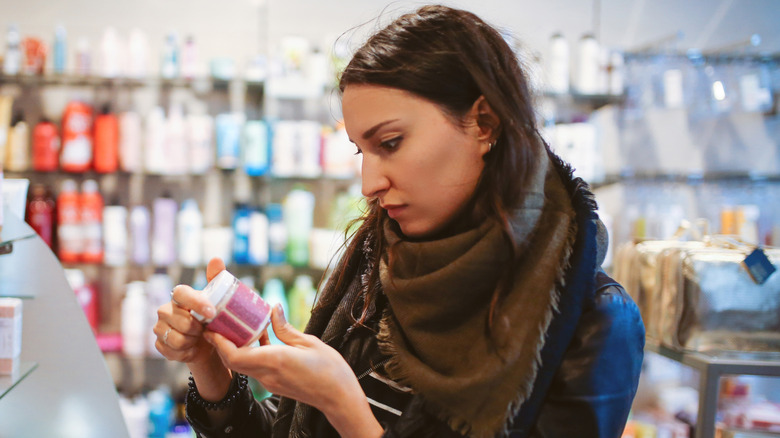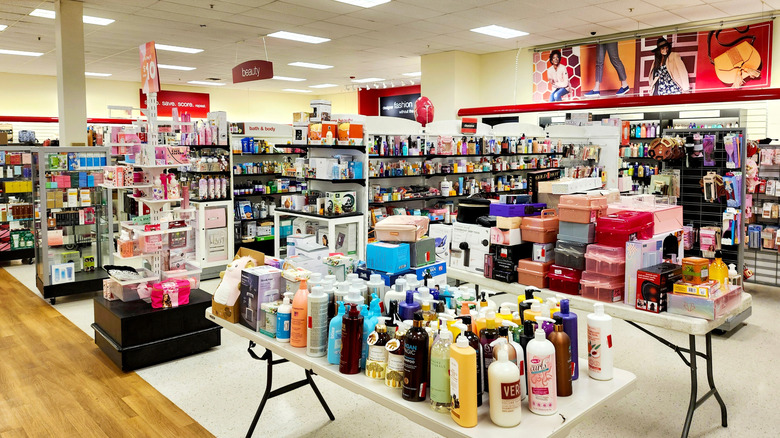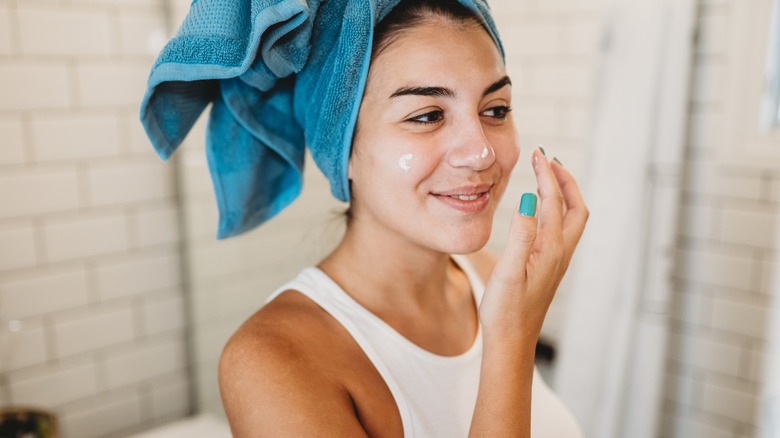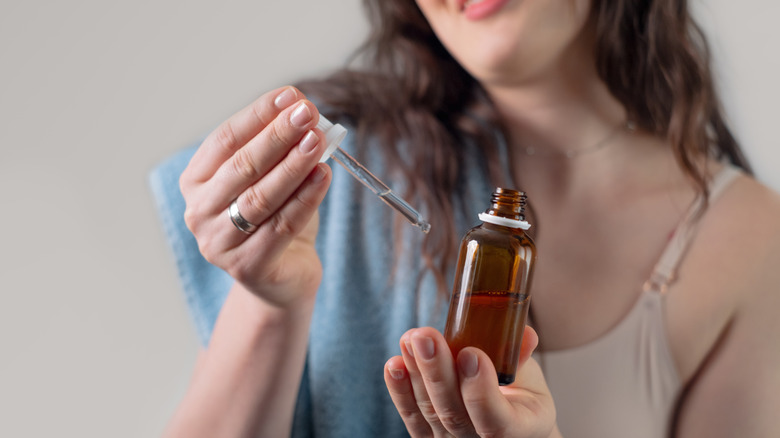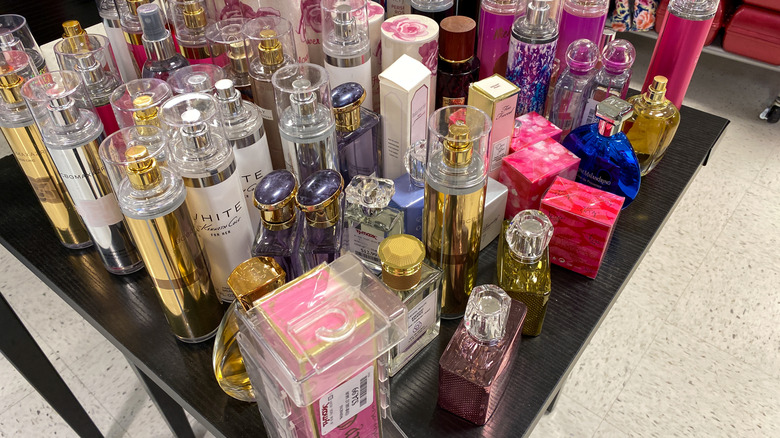TJ Maxx & Marshall's Beauty Products Are All The Rage But Come With More Than A Few Risks
There's no shame in seeking out a deal when it comes to beauty products, because those treasures can be pricey. From makeup to skincare to body care, it all adds up and can become prohibitively expensive for many shoppers. This is where the magic of places like TJ Maxx and Marshalls comes in. These discount department stores feature entire areas devoted to beauty and body care, which is what makes many shoppers come in droves. High quality brands — normally sold in boutique departments stores or places like Sephora and Ulta — are suddenly accessibly priced.
But the origins of these products — namely, how and why they arrived at places like TJ Maxx and Marshalls — can raise concerns. Consumers legitimately may wonder why such high-end products, or even standard, popular, drugstore products, wound up in an off-price store. Unfortunately, these goods can come with the risk of being expired or damaged. To better understand how safe it is to buy beauty products from these kinds of places, Women.com spoke with two experts who offered their sage advice. Ron Robinson, cosmetic chemist and founder of the skincare brand BeautyStat, weighed in on the issue, as did Double Board Certified Dermatologist Dr. Brendan Camp of MDCS Dermatology. Both offered their counsel on how to be a shrewd shopper and still take good care of your skin.
These are the potential risks of buying discounted beauty products
First of all, it's important to know what the risks are when it comes to buying beauty and skin care products at discount department stores like TJ Maxx and Marshalls. The top concern is that items are expired, as Ron Robinson, cosmetic chemist, pointed out to Women.com. This is the biggest thing to keep in mind when doing a beauty haul at these kinds of stores. After all, there are dangerous reasons not to use expired makeup. Less commonly known, hair products can also expire, and you need to know what to look out for. So avoiding expired products is a wise and legitimate shopping concern.
But before anyone gets too freaked out, Robinson noted that much of the inventory at TJ Maxx and Marshalls is not necessarily expired. Just because the product is in a discounted store doesn't mean that it's compromised. "Many high-end products are sold here because the brand could be looking to sell excess inventory," Robinson told Women.com in our exclusive interview. So, many of these items are the great finds that you think they are.
These are the risks of using expired products
What's the big deal with expired makeup products? Dermatologist Dr. Brendan Camp explained to Women.com why this is something to be aware of. "According to the FDA, 'A product's 'shelf life' generally means the length of time you can expect a product to look and act as expected and to stay safe for use.' The duration of the shelf life varies, depending on the type of product, how it is used, and how it is stored," he said.
Expiration dates matter when it comes to beauty products for a number of reasons. "First, an expired product will not be as effective as what you would expect from a new product," Dr. Camp explained. "They may not have as much lasting time, their consistency may be different, and they may not sit on your skin the same way that a new product does." Not only that, but expired merchandise can irritate the skin. "Over time, the chemical make-up of a skincare product may change and could cause skin reactions," he went on. This could manifest in contact dermatitis, with red, itchy, scaly patches of skin. Also, bacteria could contaminate the product and predispose your skin to infections. So to keep skin free of bacteria and irritation, as well as to ensure that a product will do what it says it will do, expiration dates are important when it comes to buying beauty and skin care from places like TJ Maxx and Marshalls.
Certain products are safer bets than others
In order to be smart shoppers, and be good to our skin, there are certain things to keep in mind. Ron Robinson urged shoppers to make sure that tamper seals are in place to guarantee that the product has not been opened. If packaging is clear, it's also wise to check the product itself and its container. Make sure there's no cracking, color-shifting, or product separation.
Dermatologist Dr. Brendan Camp told Women.com that certain products are safer bets than others. "Products that are more liquid in consistency tend to contain a higher water content, such as serums," he told us. "They may expire faster than dry products, such as powdered sunscreens or setting powder, or anhydrous products (those that do not contain water) such as purified oils." More specifically, vitamin C can be a tricky one, and even if you already own something with this ingredient in it, there are signs that your vitamin C serum isn't working for you. While vitamin C is great for skin, it's a little more finicky than other ingredients. So if you're browsing for vitamin C at a discount department store, be mindful. "Vitamin C, in particular, is an ingredient that is generally unstable unless it is formulated with other ingredients that help maintain its effectiveness, such as vitamin E," Dr. Camp explained. "Vitamin C products should be stored in opaque or dark bottles, as light exposure can accelerate its degradation."
What to look for on the label to make sure that merchandise is still good
If you're concerned about buying expired products at places like TJ Maxx or Marshalls, perform some due diligence right there in the aisle. Ideally, a product would list its expiration date right there on the packaging, or on the batch code. If an item doesn't list the expiration date, you can actually find it in many cases by performing a quick search. Find the batch code, which is a series of numbers and letters on the bottom of the product. Using a site like CheckFresh or an app like Cosmetic Checker, input the batch number to find out the manufacturing date. This will give you a clearer sense of how old the merchandise actually is. In many cases, it'll be fine, but it's good to know.
Chemist Ron Robinson also noted that the bottom of merchandise often has vital information. "Many show a PAO [Period After Opening] symbol on the package that shows how many months the product will expire after it's opened (this can be 6 or 12 months)," he exclusively told Women.com. "So check to make sure that the tamper seal is intact. If not, the product could be expired." All of these steps ensure that an item is still usable, and will do what it says it'll do. Once you know that something is still within its reasonable timeframe of use, then go forth and enjoy those deals!
